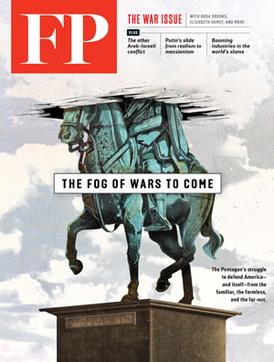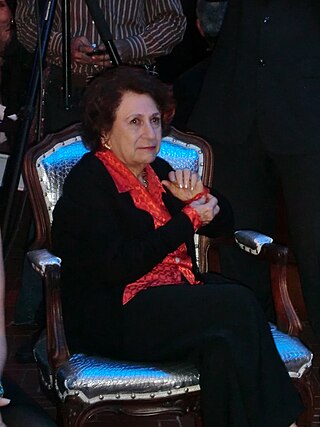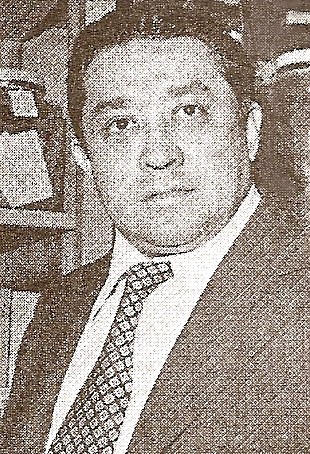Naím, Moisés (2022). The Revenge of Power: How Autocrats Are Reinventing Politics for the 21st Century. ISBN 978-125-027-920-0.
Related Research Articles

Foreign Policy is an American news publication founded in 1970 focused on global affairs, current events, and domestic and international policy. It produces content daily on its website and app, and in four print issues annually.

Lorenzo Alejandro Mendoza Giménez is a Venezuelan billionaire businessman, and CEO of Empresas Polar, Venezuela's largest privately held company, with $7 billion in annual sales. The company was founded by his grandfather and is currently owned by his family. Mendoza has been listed as one of the top 10 people believed to rebuild Venezuela.

David J. Rothkopf is an American foreign policy, national security and political affairs analyst and commentator. He is the founder and CEO of TRG Media and The Rothkopf Group, a columnist for The Daily Beast and a former member of the USA Today Board of Contributors. He is the author of ten books including Running the World: The Inside Story of the National Security Council and the Architects of American Power, National Insecurity: American Leadership in an Age of Fear, and most recently, Traitor: A History of American Betrayal from Benedict Arnold to Donald Trump. He is also the podcast host of Deep State Radio. Rothkopf also serves as a registered foreign agent of the United Arab Emirates.
A government-organized non-governmental organization (GONGO) is a non-governmental organization that was set up or sponsored by a government in order to further its political interests and mimic the civic groups and civil society at home, or promote its international or geopolitical interests abroad.

Margot Benacerraf was a Venezuelan film director. She studied at the Institut des hautes études cinématographiques in Paris and is best known for her 1959 award-winning film Araya.

Francisco Mago Leccia (“Mago”) was born in Tumeremo, Bolívar State, Venezuela on May 21, 1931 and died in Puerto La Cruz, Anzoátegui State, Venezuela on February 27, 2004. Mago was a distinguished Venezuelan ichthyologist who specialized in electric fish of the rivers and lagoons of South America, particularly of Venezuela. His education was Docent in Biology and Chemistry graduate from the “Instituto Pedagógico de Caracas”,, Master of Sciences from the University of Miami, Florida, U.S.A., Doctor in Sciences from Universidad Central de Venezuela. His Doctoral Thesis was entitled: “Los peces Gymnotiformes de Venezuela: un estudio preliminar para la revisión del grupo en la América del Sur”.

Americas Quarterly (AQ) is a publication dedicated to politics, business, and culture in the Americas.
The Carnegie Moscow Center was a Moscow-based think tank that focuses on domestic and foreign policy. It was established in 1994 as a regional affiliate of the Carnegie Endowment for International Peace. It was the number one think tank in Central and Eastern Europe and the 26th top think tank in the world, according to the University of Pennsylvania’s 2014 Global Go To Think Tank Index. In April 2022, the Carnegie Moscow Center was forced to close at the direction of the Russian government.
The Instituto de Estudios Superiores de Administración is a private non-profit Venezuelan business school with campuses in Caracas, Maracaibo and Valencia. It was founded in 1965. It has its own publisher, Ediciones IESA.

Alfredo Toro Hardy is a Venezuelan retired career diplomat, scholar and public intellectual. During his diplomatic career, he occupied some of Venezuela's top ambassadorial posts, including Washington, London, Madrid, and Brasília. As an academic, he has taught at several universities both in Venezuela and abroad, directed institutions in the field of foreign policy, and written extensively on international affairs. According to international relations best-selling author Parag Khanna: "Alfredo Toro Hardy is the quintessential scholar-diplomat". Renowned author and scholar Kishore Mahbubani wrote: "About 12% of the world's population lives in the West and 88% live outside. Yet, the strong, diverse voices of the 88% are rarely heard. Alfredo Toro Hardy provides one such voice that needs to be heard". British historian and author Robert Harvey stated: "One does not have to coincide with all of Toro Hardy's views in order to recognize that he is one of the most articulated and experienced voices not only from Latin America but from the developing world". Cambridge University scholar Geoffrey Hawthorn wrote: "Alfredo Toro Hardy has a rare and distinctive voice. No-one can come away from his essays without seeing the world in new ways". In recognition of his achievements in this field of knowledge, the Geneva School of Diplomacy and International Relations made him an Honorary Research Fellow in 2019.
In politics, a mafia state or pakhanate is a state system where the government is tied with organized crime to the degree when government officials, the police, and/or military became a part of the criminal enterprise. According to US diplomats, the expression "mafia state" was coined by Alexander Litvinenko.

Mauricio García Araujo was a Venezuelan economist who worked in both the private and public sectors. He was the president of the Central Bank of Venezuela between 1987 and 1989 during the presidency of Jaime Lusinchi (1984-1989).

The End of Power: From Boardrooms to Battlefields and Churches to States, Why Being in Charge Isn't What It Used to Be, written by Moisés Naím, discusses the decline of power in established leaders and institutions.

Gonzalo Hernández Licona is a Mexican economist and distinguished scholar in the fields of poverty measurement, economic development and social program evaluation. Hernández Licona holds a PhD in economics from the University of Oxford, a master's in economics from the University of Essex and a B.A. in economics from the Mexico Autonomous Institute of Technology (ITAM).
Vanessa Neumann is a Venezuelan-American diplomat, business owner, author and political theorist. Neumann is the president and founder of Asymmetrica, a political risk research and strategic communications firm headquartered in New York City and Washington, D.C. Neumann served for four years on the OECD's Task Force on Countering Illicit Trade, and has been a consultant to UN Women on gender-based approaches to preventing and countering violent extremism. She is the author of the 2017 book Blood Profits: How American Consumers Unwittingly Fund Terrorists, as well as its 2018 Brazilian edition, Lucros de Sangue.
Elias Mocatta (1798–1881) was a British merchant and financier, significant in the early credit history of Venezuela and other South American countries.
Gonzalo E. Vázquez is a Venezuelan investment banker. He is the founder and managing director of Vazas & Company, a financial advisory firm in Latin America.

Aquiles Este is an American semiotician and professor at the University of Miami's School of Business. His research focuses on content management and social media.
Olga Isabel Ramos was a Venezuelan activist, professor and researcher dedicated to educational policy research and analysis.
Paper Tigers and Minotaurs: The Politics of Venezuela's Economic Reforms is a book published in 1993 by Moisés Naím about his experience within the cabinet of president Carlos Andrés Pérez between 1989 and 1990, as well as its explanation of the economic phenomena that occurred during this time and the approach that was made to them as part of a report by the Carnegie Endowment for International Peace about the Americas.
References
- ↑ Davis, Noah. "Ellies 2007: So What Do You Do, Moisés Naím, Editor, Foreign Policy?". Mediabistro. Retrieved 16 September 2015.
- ↑ "Inter-American Dialogue | Moisés Naím". www.thedialogue.org. Retrieved 12 April 2017.
- ↑ "Paper Tigers and Minotaurs: The Politics of Venezuela's Economic Reforms". Carnegie Endowment for International Peace. Retrieved 16 September 2016.
- ↑ "Entrevista a Moisés Naím, por Mirtha Rivero « Prodavinci". Prodavinci.com. Retrieved 18 September 2015.
- ↑ Moisés Naím (26 April 2010). "Farewell: And thanks for reading". Foreign Policy. Retrieved 12 June 2023.
- ↑ WSJ, Weekend Edition, Dec 11-12, 2021. Review Section. Article by Moises Naim "Venezuela's Fatal Embrace Of Cuba"
- ↑ "Books of the Year". FT.com. 29 November 2013. Retrieved 16 September 2015.
- ↑ Goldstein, Gordon M. (8 March 2013). "'The End of Power From Boardrooms to Battlefields and Churches to States, Why Being In Charge Isn't What It Used' by Moises Naim". The Washington Post. Retrieved 16 September 2015.
- ↑ "The transience of power". The Economist. 16 March 2013. Retrieved 16 September 2015.
- ↑ Nick Gillespie (2 July 2013). "Why Being in Charge Ain't What It Used to Be: Nick Gillespie reviews "The End of Power" - Hit & Run". Reason.com. Retrieved 16 September 2015.
- ↑ Caño, Antonio (17 November 2013). ""Las democracias no pueden estar basadas en ONG, sino en partidos políticos" | Internacional | EL PAÍS". El País. Internacional.elpais.com. Retrieved 16 September 2015.
- ↑ Alter, Alexandra (5 January 2015). "When Mark Zuckerberg Likes a Book, Sales Soar". New York Times. Retrieved 6 January 2015.
- ↑ Illicit (film)
- ↑ "GDI - Detail". Gdi.ch. Retrieved 18 September 2015.
- ↑ "World Thinkers 2013". Prospect Magazine. 24 April 2013. Retrieved 18 September 2015.
- ↑ “Premio Ortega y Gasset de periodismo recayó en Moisés Naím”. El Universal. 12 April 2011. Retrieved 8 August 2013.
External links
- Official website
- Author page for the Financial Times’ "The A-List"
- PostGlobal Panelist
- Appearances on C-SPAN
Moisés Naím | |
|---|---|
 Naím in 2019 | |
| Minister of Trade and Industry | |
| In office 1989–1990 |
| International | |
|---|---|
| National | |
| Other | |